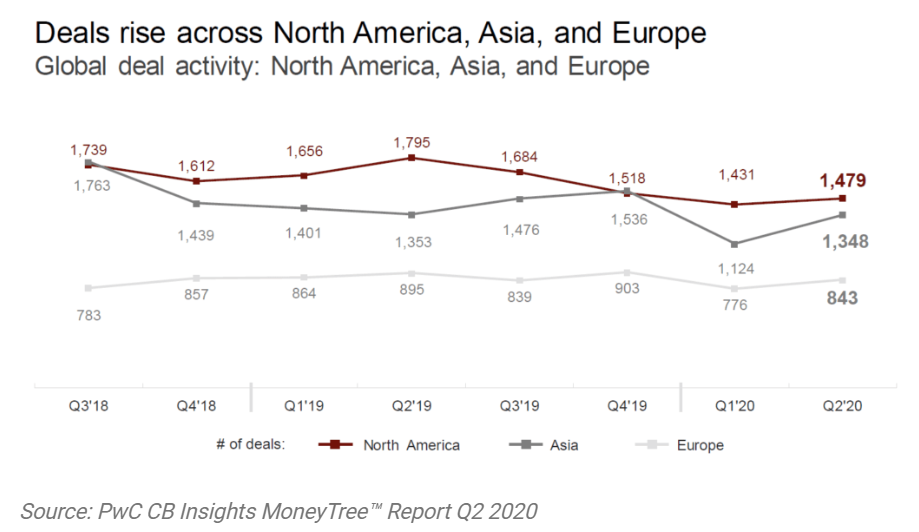Mega-deals have flourished in H1 and investors retreat to their comfort zone
From Pitchbook:
“Venture firms became much more conservative around dealmaking as the pandemic hit the US in March and early April, leading to a downturn in both VC invested and number of deals completed in Q2. Portfolio companies followed suit, adopting an understandably cautious outlook as they sought to reduce their burn rate through layoffs, cost-cutting, and curtailed expansion plans.”
“But, the impact on aggregate VC activity was hardly apocalyptic. Much of the slowdown occurred during the early part of the quarter, when uncertainty over COVID19’s impact on the economy was at its height. After the initial month and a half of exercising caution, triaging, and focusing primarily on stabilizing their own portfolio companies, VC investing began to pick up in May. While some sectors have been heavily affected by the pandemic, many startups, especially in the software and biotech sectors, have fared relatively well during the COVID-19 crisis, offering solutions to the healthcare, digital enterprise, and consumer services needs of the country.”
“Valuations have not dwindled as much as many industry professionals expected, and the
ample dry powder in the industry has allowed VCs to continue making investments—even
large ones—during the second quarter.”
“The VC industry is on pace for a record number of mega-deals, while first-time fundings are tracking for their lowest annual total in 10 years. That’s a sign that LPs are opting to commit their capital to established managers with track records of success rather than the many upstarts that made a splash the past few years.”
“The result has been a surprising fundraising boom amid an otherwise turbulent market. Firms closed $42.7 billion worth of venture vehicles in the first half of 2020, by itself a higher sum than all but three of the past 15 full years.“
“This explosion of outsized funds drove the 2020 median fund size back over $100 million for the first time since 2007. Led by major efforts from firms such as General Catalyst, Lightspeed and DCM, the median and average VC fund sizes have both more than doubled compared to 2019.”
The number of deals bounced back in Q2. According to CB Insights, deal activity in Asia rises 20% in Q2’20, compared to 9% in Europe and 3% in North America.

CB Insights also comments:
“The recovery in the second half of 2009 produced several companies that introduced industry-shaping technologies and business models. For example, Uber raised $250K in seed funding in Q3’09, while Credit Karma raised a $2.5M Series A in Q4’09.”
“This year to date, startups developing supply chain and logistics technology have attracted the largest year-over-year increase in deal activity, followed by startups in digital health. Investment in these sectors is one indication that Covid-19 is accelerating the evolution of these industries, and transformational startups may emerge.”
Digital health funding shatters records with $6.3B
From HealthcareDive:
- “Digital health received $6.3 billion in funding in the first half of 2020, shattering all previous funding records, according to a new report from research firm Mercom Capital Group. The amount is a 24% increase from the first half of 2019.”
- “Telehealth, perhaps unsurprisingly, received the most money as the COVID-19 pandemic drove unprecedented virtual care adoption, with $1.7 billion in funds.”
- “However, the pace of funding slowed in the second quarter with $2.8 billion across 161 deals, a 23% decrease compared to the first quarter and an 11% dip year over year.”
- “The slowing momentum in March and April didn’t affect telehealth, an industry that’s seen unprecedented growth as patients turn to digital solutions for their healthcare needs to avoid potential virus transmission in hospitals and doctor’s offices. Telehealth has received more than double of the next closest sector.”
- “Virtual care companies received $962 million across 50 deals in the second quarter, compared to $930 million raised in 35 deals in the first. That’s a 42% year-over-year increase, Mercom found.”
For the whole healthcare industry, venture fundraising soared to $10.4B in the first half of 2020, nearly matching 2019’s full-year record. More data and charts can be found here.
Still a high level of deal-making in the enterprise training industry
From Training Industry:
“What did mergers, acquisitions and other deals look like for the training industry this year? We still saw a high level of deal-making, perhaps reflecting the importance of training in times of crisis and the increased demand in technologies that support remote learning.”
- We saw activity in technologies and services that help organizations track, manage, measure and improve employee performance.
- Sales training and sales enablement service providers continued to be popular with investors. The show must go on, and so must sales — and, therefore, sales training.
- Platforms that support the new world of remote work, online security and medical education are in the spotlight.
Investment and M&A in enterprise L&D industry – 2020 Q1
Investment and M&A in enterprise L&D industry – 2020 Q2
Large investors enter EdTech and digital transformation of education is in the highest speed ever
From HolonIQ:
“~ $4B EdTech VC in 1H 2020 with $1.75B of that in two Chinese mega rounds. M&A back in Q2 – expect further consolidation in 2H. Many new large investors entering EdTech.”
“All hand’s on deck from EdTech and tech giants alike to support remote learning across all sectors. Tech giants across the globe are pitching in to support learners, teachers and institutions to ensure learning continues amid COVID-19 closures. Giants provide free access for educators and funding to support the continued technological transformation of education is released.”
Demand for AI-related products in education surges as learning moves to virtual. Education (K-16) has always been a slow sector to follow digital transformation, but for the first time, the pandemic has driven a seriously accelerated change.
Artificial Intelligence Startups Keep Momentum
From CB Insights:
“Funding to artificial intelligence startups has been on the rise. In 2019, AI startups received a record $28.5B in funding across over 2,300 deals. Despite the ongoing coronavirus pandemic, 2020 has seen sustained momentum — AI deals declined in Q1’20, but funding jumped by 51% from the previous quarter to hit $8.4B (Nearly 500 AI startups across 42 countries, and the mapping of AI startups in the US).” But it might recede in Q2.
For enterprises, the priority of automation will be higher than AI now, since the latter relies on good data and the justification/measurement of return on investment for some cases.
Our notes
Since semiconductors are the foundation for almost every hardware product, the monthly sales data from Taiwan’s related manufacturers is worth noting. Pay attention to the warning from Bloomberg Opinion columnist Tim Culpan: Tech’s June Jump May Lead to December Disappointment.
According to Taiwan Semiconductor Manufacturing Co., the largest contract chip manufacturer, demand for its products is being driven by 5G networks and smartphones, along with high-performance computing, such as artificial intelligence and graphics chips.
Many interesting funding events in innovative AI chips with new architectures, AI software accelerators, or quantum computing startups have been happening. There may now be hundreds of startups working on AI chips especially for gaming or special edge computing use cases.
According to some experienced investors, in the previous depression of 2008, the valuation didn’t go down until 12~18 months later. Some M&A veterans have warned that CEOs should similarly expect that the worst isn’t here yet in this depression. M&A activity has already seen sharp declines, falling to 120 exits in Q2’20 vs. 155 in Q1’20, the deal value dropped 41% according to Pitchbook.
From history, enterprises and startups had adopted more digital and automation solutions after the recoveries from previous depressions. The same may happen in this crisis. Digital transformation is accelerating, now with data and machine learning.
On the other hand, we hope to see investors to put their resources into the right companies and the right technologies to make impacts helping the society solve problems and move forward. Maybe this means they need to get out of the comfort zone. Knowledge is the power to make good judgments outside previous experiences.

